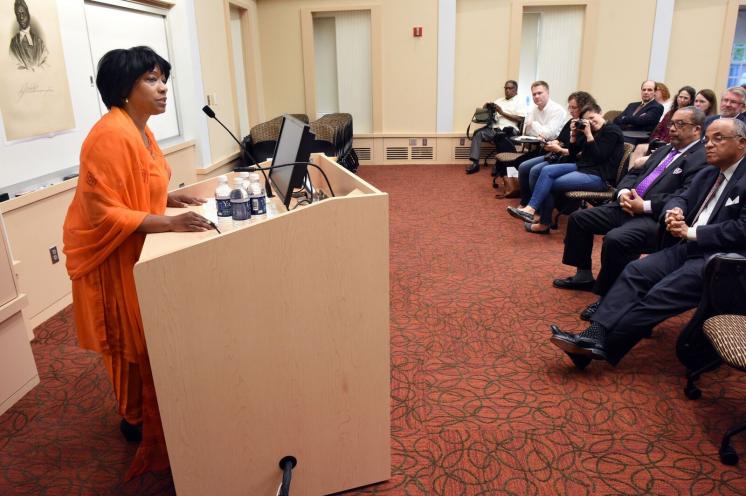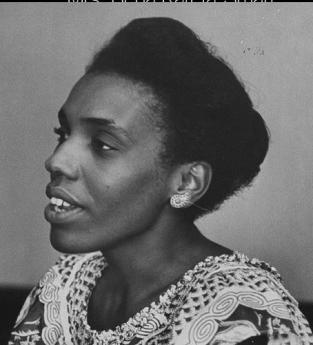Lecia Allman ’16 M.Div. has done exhaustive research for YDS on the history of diversity at the School. One of her biggest projects went live on the School’s website in early December. Titled “The Changing Faces of Yale Divinity School,” the online exhibition presents photos and biographical information about distinguished alumni of color. It also documents the “firsts” of various categories—African American, Asian American, Hispanic American, and women.
“Lecia Allman has done so much to recover and help us understand the history of the Divinity School,” Dean Greg Sterling says.
Allman took time from her job at Emory University to answer a few questions about her diversity research, her YDS experience, and her life after YDS.
 What motivated you to start researching the history of diversity at YDS?
What motivated you to start researching the history of diversity at YDS?
As I traversed the halls of YDS, I noticed ethnic students and females in the majority of the graduation composites, but only a couple of women and no ethnic photos on the walls. I also heard the constant complaint about this situation from both ethnic and white students. Ever the problem-solver and biographical historian, I first took a reading class with the late Yolanda Smith, researching and writing the biography of the first black female graduate, Rena Weller Karefa-Smart ‘45 M.Div., during my second semester. Simultaneously, I studied each and every class composite, noting the black students, and building a chart. Over the summer, following that first year, I began researching the biographies of each graduate, in chronological order. The information was later condensed into a template format. I used similar methods to develop the collections of Asian and Hispanic students.
It must have been very difficult to find information about, and photos of, these people who studied here so long ago. What were some of the methods you used to track down this material?
I am an amateur genealogist. By using several ancestry sites, and by becoming a coder for familysearch.org—the Mormon site that is the original recipient of the demographic data—I was able to uncover a great deal of information. Other sources included Yale student demographic information books dating from the early 1800s, including obituaries, class bulletins, archival material, and more. I got results by trusting my nose for news and following whatever paths and links I could discover. I am tenacious when it comes to uncovering lost information! My experience as a competitive analyst for AT&T in my professional life before YDS helped me develop skills for uncovering information.

James Pennington was my first “aha moment.” I was also inspired by the many historic accomplishments of Rena Karefa-Smart, most of which took place outside of the United States. The discovery that she was still alive and that Dean Sterling was willing to bring her to the 2015 graduation banquet was a high moment for me.
Learning that the first Asian-Pacific graduate helped form the Communist Party and that he was buried in Russia was interesting. Learning that the first Hispanic male, Justo Gonzalez ’58 B.D., was alive—and the author of more than 110 books!—was fascinating. I was very pleased that he came to YDS last spring for the Hispanic theology conference. Learning that the first female Prime Minister of South Korea, Sang Chang ‘70 M.Div., was a YDS alumni was exciting. And just reading about so many meaningful, influential, and amazing accomplishments by so many of our alumni made me realize the value of this YDS education.
Where are you now, post-graduation, and what ministry work are you pursuing?
I am currently an Emory Fellow, fulfilling a one-year chaplain residency in palliative care at Emory in Atlanta. I am excited to be included in the emerging field of palliative care medicine because it emphasizes the necessity and contribution of spirituality as it intersects with this branch of medicine. I am being provided with opportunities to research and write about this and unravel some of its mysteries for others. I believe that I have been given an amazing and unexpected opportunity.
What was your YDS experience like and how has it influenced the direction of your life and career?
My YDS experience was enjoyable. I confirmed my beliefs and still grew. YDS provided me with bi-vocational exposure in the Law School and in the School of Public Health. I was encouraged to research the subjects that interested me. My plans did change after the first year. Although I have completed the ordination process, I no longer see myself as a pastor. My current stage is much larger than my original vision. I am grateful for the many opportunities, new friends, strong support, and fresh start that I encountered through my YDS experience.
What’s something you would like all potential students to know about the experience of studying at YDS?
I think the most important thing you can do for yourself is to do a self-assessment after each semester to see whether or how you have changed from your previous semester. If you do not take the time to re-center yourself, you can easily become lost. On the other hand, spread your wings and take advantage of the many opportunities available. It does not hurt to pursue the half full part of the glass.